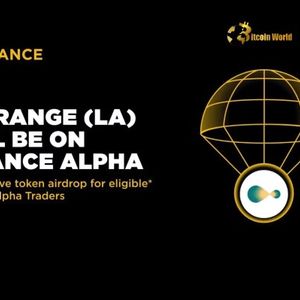BitcoinWorld SEC Raises Crucial Questions on Ethereum and Solana Staking ETFs Are you following the evolving landscape of cryptocurrency investments? A significant development is currently unfolding that could impact how investors gain exposure to popular digital assets like Ethereum (ETH) and Solana (SOL) through regulated products. The U.S. SEC is reportedly scrutinizing proposed exchange-traded funds (ETFs) that aim to include staking rewards, potentially adding another layer of complexity to the journey towards wider crypto adoption in traditional finance. The Latest SEC Inquiry into Staking ETFs According to recent reports from Bloomberg, the U.S. Securities and Exchange Commission ( SEC ) has initiated discussions with firms proposing innovative crypto investment products. Specifically, the regulatory body is questioning the structure of planned Staking ETF products from REX Financial and Osprey Funds. These firms are seeking to launch ETFs that would not only hold ETH and SOL but also engage in staking activities to generate yield for investors. The core of the SEC’s concern centers on whether these products would qualify as ‘investment companies’ under federal securities law. This classification has significant implications for how a fund must be regulated and structured. REX Financial’s general counsel, Greg Collett, has acknowledged the SEC’s questions, stating that the firm believes it can address these concerns. Importantly, REX will not proceed with the launch of their proposed funds until these regulatory hurdles are cleared. Understanding Staking ETFs: What Are They? Before diving deeper into the regulatory challenges, let’s clarify what a Staking ETF intends to do. Traditional ETFs often hold assets like stocks, bonds, or even cryptocurrencies (like the spot Bitcoin ETFs recently approved). A staking ETF aims to go a step further by participating in the staking process available on certain blockchain networks, such as Ethereum (post-Merge) and Solana. Staking involves locking up cryptocurrency assets to support the operations and security of a proof-of-stake blockchain. In return for contributing to the network’s validation process, stakers earn rewards, typically in the form of additional cryptocurrency. A staking ETF would essentially pool investor funds, purchase the underlying crypto (ETH or SOL), stake it, and potentially distribute the staking rewards back to the ETF shareholders. The potential benefits for investors include: Yield Generation: Earning passive income from staking rewards in addition to potential price appreciation of the underlying asset. Convenience: Accessing staking without the technical complexity, minimum balance requirements, or lock-up periods often associated with direct staking. Regulatory Wrapper: Investing through a familiar, regulated financial product (an ETF). Why the SEC is Concerned About ‘Investment Company’ Status The U.S. SEC ‘s line of questioning regarding the ‘investment company’ status of these proposed funds is a critical point. The Investment Company Act of 1940 governs entities that primarily engage in investing, reinvesting, or trading in securities. Funds classified under this act are subject to stringent regulations regarding structure, operations, and investor protection. The SEC’s concern likely stems from the active nature of staking. While simply holding crypto might be viewed differently, actively participating in network validation, earning rewards, and potentially managing those rewards could lead the SEC to view the fund’s activities as crossing the threshold into being an ‘investment company’ that needs to comply with the 1940 Act. This could impose significant operational and compliance burdens on the fund structure proposed by REX and Osprey. The distinction the SEC is drawing might relate to whether the staking activity constitutes managing an investment portfolio for others, which is a hallmark of an investment company. Navigating this legal interpretation in the context of novel blockchain activities is a new frontier for both regulators and fund issuers. What This Means for Ethereum ETF and Solana ETF Aspirants This development specifically impacts firms like REX and Osprey aiming for a Ethereum ETF and Solana ETF with staking components. It signals that simply getting a spot crypto ETF approved might not clear the path for products that incorporate yield-generating activities like staking. For the broader market, this raises questions about the future of yield-bearing crypto products within regulated ETF structures in the U.S. While spot Bitcoin ETFs were approved earlier this year, Bitcoin’s network (Proof-of-Work) does not involve staking in the same way Ethereum and Solana (Proof-of-Stake) do. This difference in consensus mechanisms presents unique regulatory challenges for ETH and SOL-based products. It suggests that firms may need to either: Find a way to structure the staking ETF that satisfies the SEC’s concerns about the ‘investment company’ definition. Propose non-staking versions of Ethereum and Solana ETFs first, similar to the approved Bitcoin ETFs. Engage in potentially lengthy legal and regulatory discussions to clarify how staking fits within existing securities laws. The Path Forward for Crypto ETF Innovation The dialogue between the SEC and fund issuers like REX and Osprey is a crucial step in defining the boundaries for Crypto ETF innovation in the U.S. While it introduces uncertainty and potential delays for staking ETFs, it also represents the regulatory process at work, attempting to fit new technologies into existing legal frameworks. The outcome of these discussions will be closely watched by the entire crypto industry and traditional finance. A clear path for staking ETFs could unlock significant capital and provide investors with regulated access to yield from major proof-of-stake assets. Conversely, significant regulatory hurdles could push firms towards simpler spot ETH or SOL ETFs first, or potentially stifle certain types of crypto-linked products in the U.S. market for the time being. Key Takeaways: The SEC is actively reviewing proposed ETH and SOL staking ETFs. The main regulatory hurdle is the ‘investment company’ classification under the 1940 Act. Firms like REX are working to address these concerns before launching. This highlights the ongoing challenge of fitting novel crypto activities like staking into existing financial regulations. The resolution will impact the availability of yield-generating crypto products in the U.S. ETF market. Conclusion: Navigating the Regulatory Waters The U.S. SEC ‘s questioning of Staking ETF proposals from REX and Osprey underscores the complex regulatory environment surrounding cryptocurrency products. While firms are eager to bring innovative products like a Ethereum ETF and Solana ETF with staking to market, they must first navigate the intricate web of federal securities laws. The focus on the ‘investment company’ status reveals a specific area of regulatory scrutiny related to the active yield-generating nature of staking. The industry awaits further clarity, which will ultimately shape the types of regulated crypto investment vehicles available to U.S. investors in the future. To learn more about the latest crypto ETF trends , explore our articles on key developments shaping the future of crypto investing . This post SEC Raises Crucial Questions on Ethereum and Solana Staking ETFs first appeared on BitcoinWorld and is written by Editorial Team















